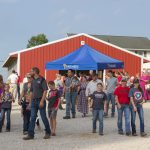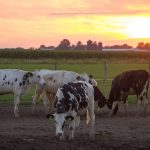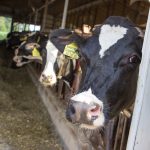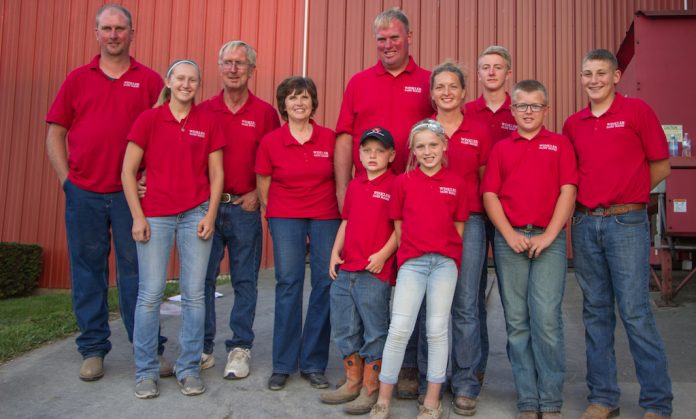
(Scroll down for photo gallery)
STERLING, Ohio — Life doesn’t stop on a dairy farm — even if hundreds of your fellow farmers and friends stop in for an evening tour.
As people walked from barn to barn, checking out the cows and facilities, Rebecca Winkler pushed a calf cart back and forth across the gravel drive as more than one calf was born that evening.
“I saw at least three calves born today,” said Rory Lewandowski, OSU Extension educator of agriculture and natural resources in Wayne County.
“The cows don’t stop, and the Winklers do a good job managing them,” he told the crowd as they came together near the barn bank of Winkler Farms LLC, in Sterling, to hear from the Winkler family.
What does it take to pass the farm to the next generation? How does a dairy survive when the cost of production exceeds the cost of milk? And how do you keep your neighbors happy when you farm “in the city”?
These questions and more were answered by the Winkler family during the Ashland and Wayne County Dairy Twilight Tour July 10.
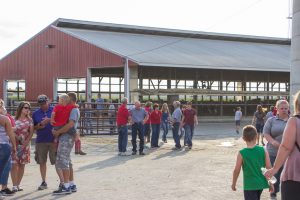
The family
Jim and Joan Winkler own and operate Winkler Farms with their two sons, Jeff and Jerrod, and Jeff’s wife, Rebecca, and their three children. Currently they milk 365 head of Holstein cattle three times a day, with a rolling herd average of 27,657 pounds of milk and an average somatic cell count below 100,000.
In total, the Winklers have 715 cows and replacement heifers.
At the Wayne-Ashland Dairy Service annual meeting in March, Winkler Farms received the Herd Management Award and the farm was a silver winner in the 2017 National Dairy Quality awards program.
Quality feed
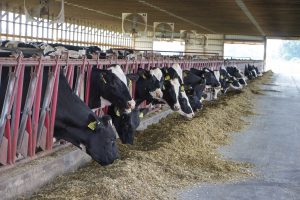
“In order to have a high producing herd, you have to have good feed,” said Lewandowski.
“A dairy cow eats nine to 14 meals a day. The Winklers use good feed management, good rations and provide an environment where the cow is comfortable and wants to eat.”
Jeff Winkler, farm manager, said the family farm can produce most of what the cattle eat. They grow around 250 acres of hay, 400 acres of corn and 300 acres of soybeans.
“We’re making haylage that has 24 percent protein. That’s what makes good milk,” he said.
Cow comfort
Another key to having high-producing cows is cattle comfort, said Lewandowski.
“Cows would really like it to be 45 degrees out. If they are uncomfortable, they don’t eat.”
Even walking through the Winkler barns on an 80-degree summer day like it was the night of the tour, the barns stayed relatively cool, thanks to large fans and plenty of ventilation that kept the air flowing.
Manure management

Manure management is also crucial on a dairy farm. When you have a large volume of high-producing cows, you’re going to have a large output, said Lewandowski.
With around 150 gallons of waste being produced on the farm on a daily basis, Lewandowski said the family manages it all very well.
“It’s so important, especially with water quality regulations today,” he said.
Calf care
Winkler Farms also takes pride in their calving program, under the watchful eye and careful management of Rebecca Winkler.
She said some of the biggest challenges this year in calf management has been having space for new calves, and respiratory issues.
A recently built calf barn was constructed specifically to promote better air flow and ventilation and combat some of these health concerns.
Winkler Family
Jim and Joan Winkler own and operate Winkler Farms LLC with their two sons, Jeff and Jerrod, and Jeff’s wife, Rebecca, and their three children. Winkler Farms hosted the 2018 Dairy Twilight Tour July 10, in Sterling, Ohio. (Catie Noyes photos)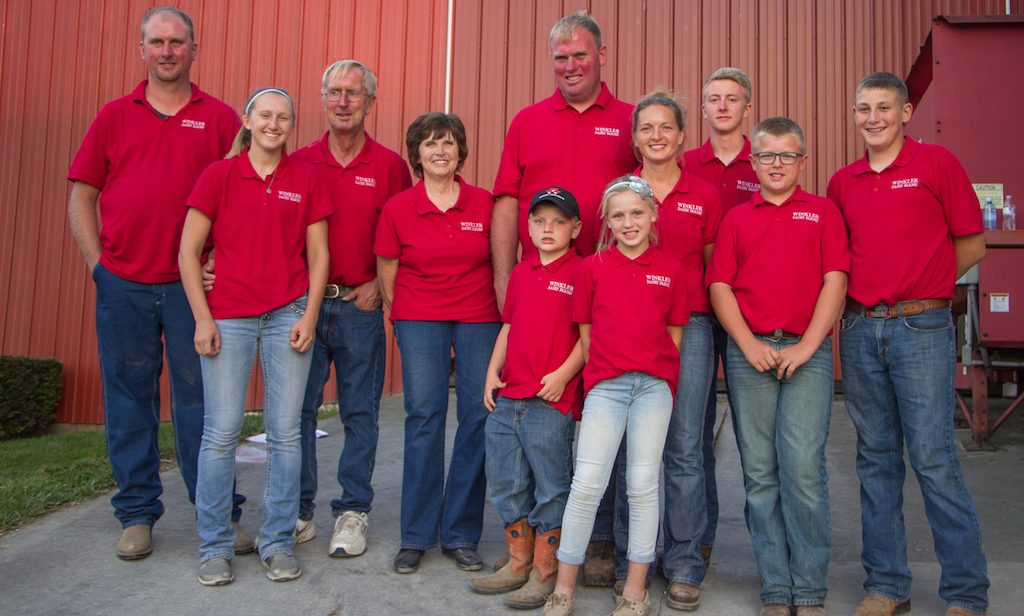
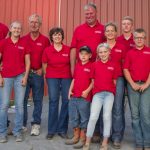 View
View
Winkler Family
Jim and Joan Winkler own and operate Winkler Farms LLC with their two sons, Jeff and Jerrod, and Jeff’s wife, Rebecca, and their three children. Winkler Farms hosted the 2018 Dairy Twilight Tour July 10, in Sterling, Ohio. (Catie Noyes photos)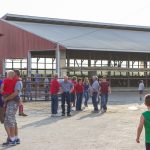 View
View
Winkler Farms
Hundreds of farmers, industry professionals and those just curious about what goes on at a dairy farm stopped out at Winkler Farms, July 10, for the Dairy Twilight Tour.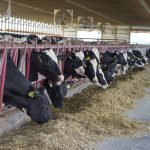 View
View
Quality feed
In order to have high producing cows, you must have high quality feed. The Winklers produce haylage at 24 percent protein content, which Jeff Winkler said, makes good quality milk. View
View
Dairy Twilight Tour vendors
Around 90 vendors set up at the Dairy Twilight Tour showcasing the latest equipment, seed products, financial services and more.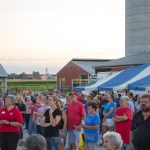 View
View
Interviewing the Winklers
Hundreds of tour goers stop and listen as the Winkler Family is interviewed during the Dairy Twilight Tour. View
View
The Winkler Family
The Winkler family answered questions about farm succession planning, farming with neighbors and battling low milk prices during the Dairy Twilight Tour. View
View
Winkler Farms calf facility
Calf care is a top priority at Winkler Farms. A news calf facility was built to promote better air flow and ventilation.Farming with neighbors
How do you keep the neighbors happy when your dairy sits right in the center of a small village?
“You see that garden over there,” said Jim Winkler. “When you take fresh produce to the neighbors, it helps,” he said with a grin.
While Sterling is by no means a big city, it is a township with houses on all sides of the farm.
Jim said every three weeks someone comes out to the farm to spray for flies and the family does their best to keep the barns clean to keep odors down.

Dairy prices
“The question I’ve got asked a lot today is, ‘When is the milk price going to get better?’” said Dianne Shoemaker, Ohio State Extension dairy field specialist.
“I wish I had the answer,” she said, adding prices have taken another drop and the Dairy Margin Protection Program is extending payments through September. “We hope it gets to where there are no payments.”
“It’s tough times in the dairy industry — when you’re getting $15 a hundredweight for milk and it costs $17 to produce it,” said Lewandowski.
It also can be discouraging to the next generation
Next generation
As the bookkeeper and family matriarch, Joan Winkler said, “We’re trying to keep the kids interested and the morale up, especially in times like this.”
She added it can also be tough giving up control when the farm has been a part of your life for so long.
“I’ve been on this farm since 1950 and I haven’t left yet,” said Jim.
Joan added they work closely with an attorney to make sure the transition is smooth and all their affairs are in order.
“We are trying to work toward getting some of the things turned over,” she said, noting her son Jeff has taken on more responsibilities as the general manager of the farm.

County services
“Don’t be afraid to ask for help,” said Tom Stocksdale, president of the Wayne-Ashland Dairy Service Unit.
He said there are many other farms in the county going through similar experiences who can offer advice and there are many resources available.
“We are fortunate to live in a county where we have access to many different agricultural services, many of which are here today,” said Stocksdale.
Around 90 vendors were set up at Winkler Farms.
“I know people who drive two hours for parts. Here in Wayne County, we don’t do that,” he said.






